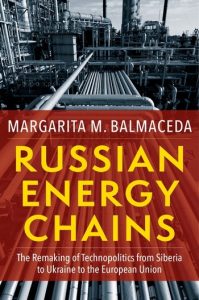March 19, 2022
Margarita Balmaceda, Andrian Prokip, Oleh Savitsky, Guido Hausmann, Steven Seegel
View the recording:
Margarita Balmaceda, Andrian Prokip, Oleh Savitsky, Guido Hausmann, Steven Seegel
View the recording:

Energy entanglements and supply chains involving actors in Russia, Ukraine, and the European Union are key for understanding the sources and directions of Russia’s war against Ukraine. Following three energy molecules (a natural gas molecule, an oil molecule, and a coal molecule) traveling from production jn Siberia to final use in Germany, Margarita Balmaceda’s new book, Russian Energy Chains: the Remaking of Technopolitics from Siberia to Ukraine to the European Union (Columbia U.P., 2021) analyzes these entanglements from the perspective of the threat and temptation embodied in these chains. This presentation, will highlight how different aspects of this triangular relationship as discussed in the book play a key role for understanding the current crisis – from the uniqueness of Russian domestic energy politics to the tensions in EU and German policy affecting their responses to Russia. Russian Energy Chains is available for purchase here. Use code CUP20 at checkout for 20% discount; chapter one of the book is also available at the above link.
Participants
Margarita M. Balmaceda (author) is Professor of Diplomacy and International Relations at Seton Hall University. Concurrently, she is an Associate at the Harvard Ukrainian Research Institute (HURI), and heads the Study Group on “Energy materiality: Infrastructure, Spatiality and Power” at the HWK Hanse Wissenschaftskolleg (Germany). With support, among others, a Marie Skłodowska-Curie Fellowship from the European Commission, a Woodrow Wilson Fellowship, and three Fulbright Fellowships, she has conducted extensive research in Ukraine, Russia, Belarus, Lithuania, Moldova, Hungary, Germany and Finland. Her education includes a Ph.D. in Politics from Princeton University, Post-doctoral training at Harvard University, and ongoing training on metallurgical technology through courses at the World Steel University.
Commentators:
Dr. Andrian Prokip is director of the energy program at the Ukrainian Institute of the Future Український інститут майбутнього (Kyiv) and Senior Associate at the Kenan Institute (Woodrow Wilson Center, Washington DC), where he also was a Fulbright-Kennan Institute Research Scholar in 2015-2016 and is a frequent contributor to its publications series.
Mr. Oleh Savitsky is a climate and energy policy expert at the Ukrainian Climate Network (UCN), board member of the NGO Ecoaction/ Екодія (Kyiv), and a former fellow of the Succow Foundation (Greifswald, Germany). His main focus is the coal industry, decarbonisation of the power sector and heavy industry as well as reduction of air pollution.
Prof. Guido Hausmann is Head of the History Division at the Leibniz Institute for East and Southeast European Studies (Leibniz-Institut für Ost- und Südosteuropaforschung – IOS) and Professor of History of Southeast and Eastern Europe, University of Regensburg. Among other fellowships, he was a HURI Visiting Fellow in 2003.
Prof. Steven Seegel, a historian of geography and cartography in Ukraine and its neighbors, is Professor of Slavic and Eurasian Studies at The University of Texas at Austin, the host on three channels at the New Books Network (NBN) podcast series, and a former director of the Harvard Ukrainian Research Institute’s summer program (HUSI).
